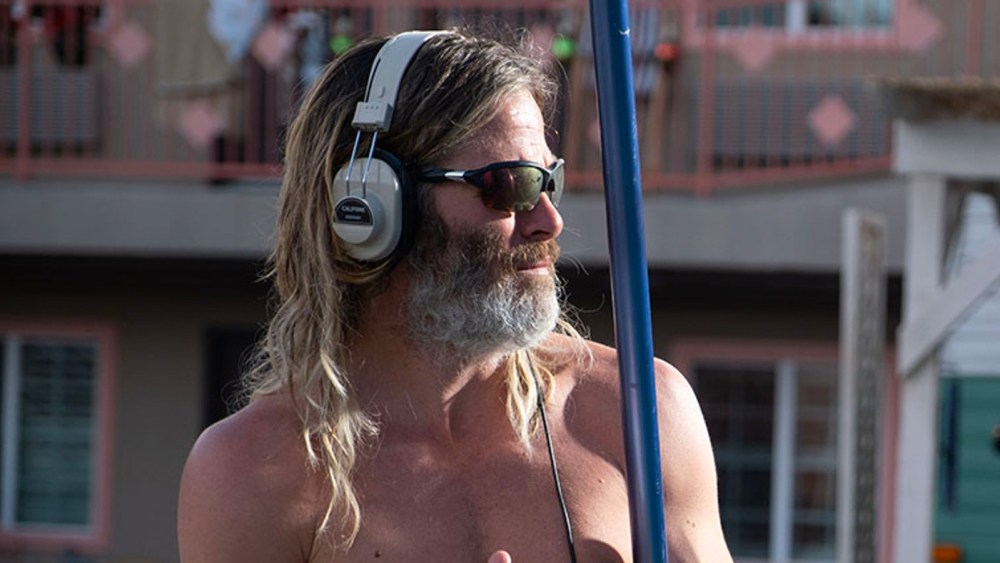
I’m a fan of Chris Pine: the early Shatner-smooth charisma, the powerful chops he’s displayed in movies like “Hell or High Water,” the authoritative snap of his performance as the cult-leader heavy in “Don’t Worry Darling.” So I take no vicious pleasure in saying that “Poolman,” a movie that Pine co-wrote, directed, and stars in, is not only the worst film I saw during the fall festival season but would likely be one of the worst films in any year it came out. Okay, maybe I’m taking a bit of vicious pleasure in saying that, since I had to sit through the goddamn thing. At the Toronto Film Festival showing I attended, there were a lot of walkouts.
“Poolman,” to the extent that you can discern the ragged crayon scrawl of a design in it, wants to be one of those daffy, rambling, sick-soul-of-Los-Angeles detective noir comedies, like “The Long Goodbye” or “Under the Silver Lake.” Pine, with scraggly hippie hair and a graying beard, padding around in salmon-colored swim trunks and cool shades, plays Darren Barrenman (check the existential last name!), a swimming-pool attendant who lives in a Tiki shack next to a dilapidated L.A. apartment complex. His job consists of taking care of the apartment pool — no other pools in the city, just that one! He’s an eccentric lazybones who speaks in wispy stoned wannabe epigrams, so the idea seems to be that he’s playing some variation on the Dude from “The Big Lebowski.” But the Dude was fun, the Dude had a sharp tongue, the Dude abided. Darren just irritates.
Early on, he sits down at the small manual typewriter in his shack and dashes off one of the civic-minded crank letters he regularly writes to Erin Brockovich, whose photograph hangs on his wall like a shrine. There’s an endless scene of pillow talk between Darren and his girlfriend, Susan (Jennifer Jason Leigh), and it’s here that we first plug into the film’s unique mode of dialogue: half-finished thoughts, whimsical non-jokes, a perpetual dangling conversation that doesn’t connect with itself or go anywhere. But the gauzy slacker sub-parody of movie chatter (the script is by Pine and Ian Gotler), which creates the impression that the actors are at once making up and forgetting their lines, is somehow meant to sustain us through a 100-minute feature.
When Darren isn’t spewing absurdist gibberish or working on one of his origami sculptures, he marches down to a city council meeting dominated by a corrupt official (the always redoubtable Stephen Tobolowsky) who is, for no good reason, an Orthodox rabbi. The character has yet another layer of identity, revealed late in the film, that manages to be both au courant and oh so retrograde.
At the council meeting, Darren stands at the mic and acts like someone who has lost his marbles, and it’s here that we confront the central delusion that drives terrible movies directed by actors who are also starring in them. The auteur-narcissist believes that the audience is automatically going to be enraptured by everything he’s doing. It’s thespian exhibitionism run amok. The job of actors is to think that way. But the job of directors is to reign them in. In cases like this one, where the actor-showoff is the director, it’s as if the inmate were taking over the moviemaking asylum.
There is, of course, a femme fatale — played by DeWanda Wise, whose sultry stylings, though meant to be a manipulative act, are also the only unironic thing in the movie. She’s a relief to watch. It’s this character who leads Darren into the film’s rickety conspiracy plot, which isn’t really a plot, more like a fragment of a signifier of a situation. But it pretends to be just specific enough to reference “Chinatown,” in that it’s also about a Mr. Big illegally diverting water use for his own nefarious purposes.
There are good actors who get pulled into the hollow maelstrom of “Poolman,” like Annette Bening and Danny DeVito, acting as broadly as they can as the apartment dwellers who are Darren’s parent figures. At first, we think they are his parents, but Bening turns out to be his “Jungian therapist,” and DeVito is a documentary filmmaker who gets enlisted to help Darren make some sort of filmed exposé of the government misdeeds he’s uncovering. This is the kind of idea that “Poolman” is built around — one that never exists in reality so much as it does on the blank-page-stuffed-into-the-manual-typewriter of Chris Pine’s mind.











